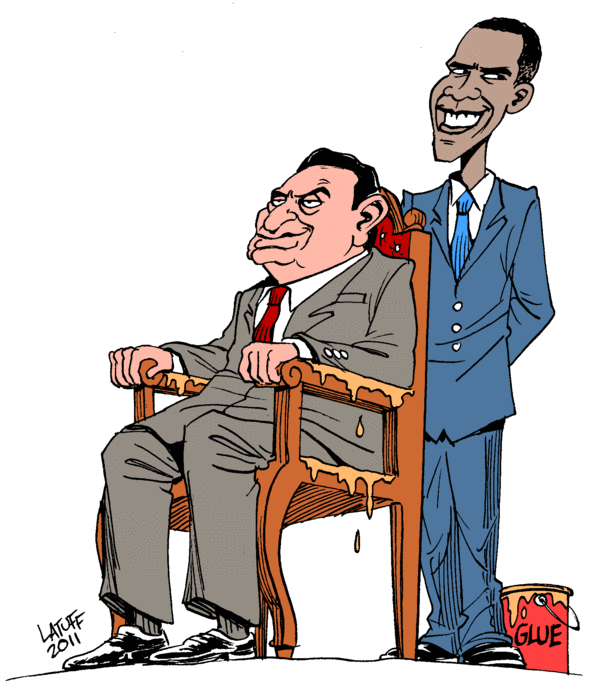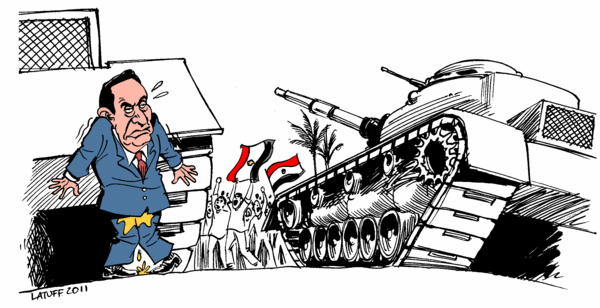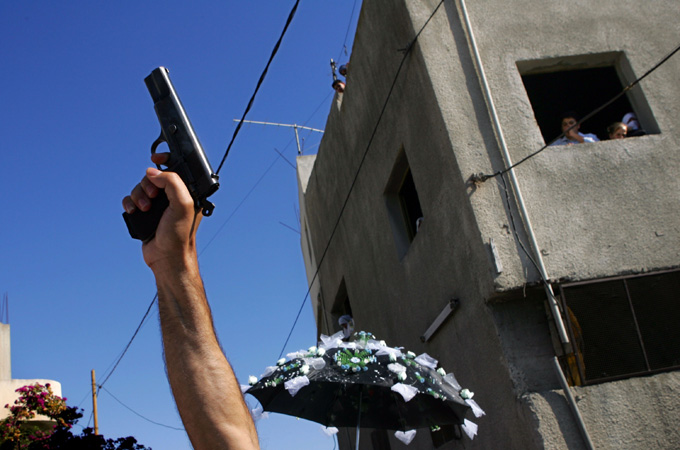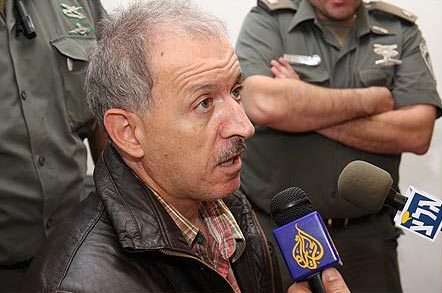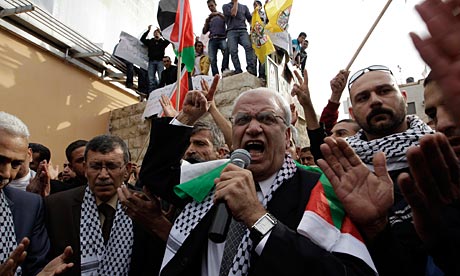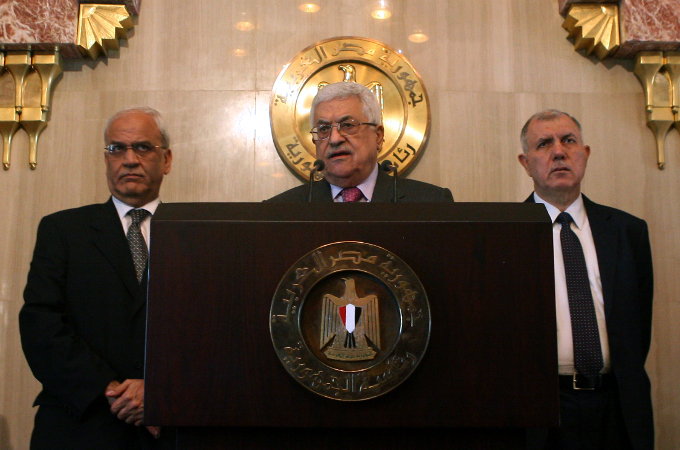EDITOR: The final stage of the revolution seems to be here!
In another facile speech, Mubarak has clarified beyond any doubt, that he is not in touch with reality. Omar Suleiman, his sidekick and servile deputy, is not much more connected either. Both seem to think that they can spout more lies and get the demonstrators home, and continue with their corrupt regime, by promising democracy by September. The Egyptian people know – it is now or never!
Meanwhile, on the farm in Washington, the animals are in disarray… not quite decided if they prefer democracy to ‘stability’ they keep swivelling like a weather-vane gone out of control. It seems that Obama is listening to both sides, and keeps changing his mind on a daily basis. Two things are now clear:
1. The US administration is not well-informed (they don’t seem to have Al Jazeera on the White House channels…) and is not clear about what is happening in Egypt. This may sound incredible, but there is no other expalnation to their bizarre switching of policy.
2. The US administration is also not clear and have not decided what they want out of this situation – do they prefer to see the dictator continue and choke the Egyptian people, or do they risk allowing democracy in Egypt to develop? The choice is difficult for a governemnt which has supported dictators and and brutal occupations as far as memory goes, and not just in the Middle East. Do they want ‘stability’, or do they want to foment unrest and be the arbiter?
This situation is most dangerous for the whole Middle East, now moving at enormous speed to modernise and democratise, after decades of corrupt and brutal regimes. In the end, the US seems just as confused as Mubarak about the direction of events.
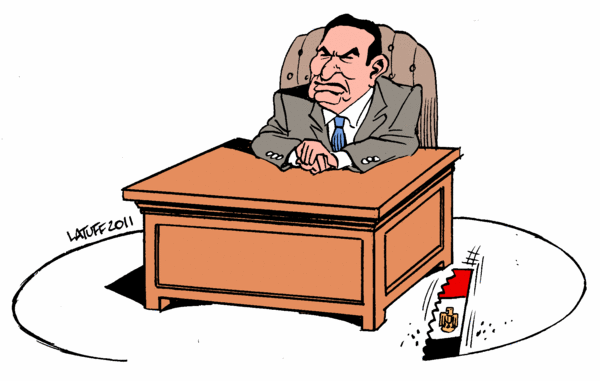
BREAKING NEWS!
Protesters outraged over Mubarak address, vow to continue revolution: Ahram online
Ahram Online, Friday 11 Feb 2011
Hundreds of thousands of Egyptians gathered in Tahrir sq and downtown Cairo this evening to celebrate what they believed was the imminant stepping down by President Hosny Mubarak were dumbfounded, then outraged as Mubarak finally addressed the nation on TV. Though Mubarak concluded his address by announcing the transfer of his powers to the vice president, he repeatedly asserted in the course of the address that he will remain in power until the end of his term in September.
Chanting “down with Mubarak”, “down with the regime”, the protesters vowed to mainting their occupation of Tahrir sq and their demonstrations until they bring Mubarak and his regime down, once and for all. They expect to bring millions to the streets in Cairo and across the nation in tomorrow’s Friday of Decision protest.
Egypt: A new wave of workers strikes and sit-ins: Ahram Online
Mass protests demanding change have triggered a fresh wave of mass strikes and workers’ sit-ins across the country Wednesday, spotlighting long-ignored economic demands
Wednesday 9 Feb 2011
Workers in Cairo joined thousands of state employees on strike Thursday in spreading labor unrest that has pumped further strength and momentum into Egypt’s wave of anti-government protests. Writing in Arabic on placard center-left reads “Increase basic pay” and on placard center-right “End of work pension: 60 months. Infection risk pay: 100 percent. Rule No. 48 replacing rule No. 47.” (AP Photo/Ben Curtis)
Related
Five Suez Canal companies workers go on strike, no major disruptions witnessed yet
Demonstrations and strikes across Egypt
Steel and Canal shipyard workers strike in Suez continues
Following the “Million Man” demonstrations and mass strikes that escalated across Egypt on Tuesday, a new wave of mass strikes and workers’ sit-ins also spread on Wednesday.
Ahram Online has been receiving continuous reports of strikes breaking out in both public and private companies across the country, many of which are still being confirmed. At the time of publishing, the Center for Trade Union and Workers Services (CTUWS) had confirmed the following:
More than 2000 workers started a strike in Helwan’s silk factories and circulated the office of the company’s chairman demanding his exclusion.
Thousands of workers have started a strike in Helwan’s coke factories demanding higher wages and full-time contracts.
In Mahala’s Spinning and Weaving factory, hundreds started a sit-in in front of the administration building.
In Kafr El-Zaiat hospital, 1500 nurses started a sit-in demanding their late wages.
Four hundred workers in Suez’s Egypt National Steel Factory started an open strike demanding higher wages.
In Menoufeia, more than 750 of Schweppes factory workers started a sit-in demanding higher wages.
More than 800 of the spinning and weaving workers in Menoufeia started a sit-in demanding higher wages.
In Cairo, 200 workers from the General Committee for Drug Supervision started a sit-in demanding full time contracts and higher wages.
Apart from the demands calling for democratic reforms that have triggered Egypt’s mass protests, social and economic needs have been at the core of the country’s political unrest in recent years.
Although a 2010 court ruling demanded that a new minimum wage be set, the government promised to set a minimum of only LE400 per month (about $70), allowing tensions to soar.
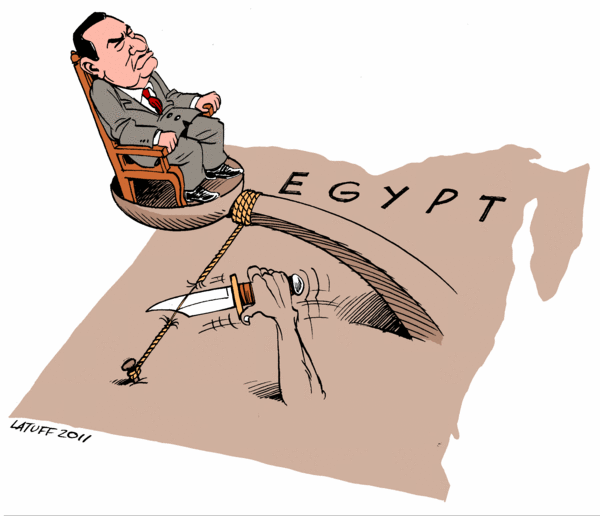
Egypt’s Mubarak refuses to quit: BBC
President Mubarak addressed the nation in a television broadcastContinue reading the main story
Egypt Unrest
Egypt’s President Hosni Mubarak has said he will stay in office and transfer all power only after September’s presidential election.
His comments in a national TV address confounded earlier reports that he was preparing to stand down immediately.
Mr Mubarak said he would delegate some powers to Vice-President Omar Suleiman, but the details of this remain unclear.
Thousands of anti-government protesters in Cairo’s Tahrir Square reacted angrily to his announcement.
There were chants of “Down with Mubarak”, and protesters waved their shoes in disgust. Thousands were reported to be heading towards the presidential palace some distance away.
The BBC’s Paul Adams, in Tahrir Square, said the mood contrasted dramatically with the celebratory, almost party atmosphere that existed in the hours running up to President Mubarak’s televised address.
Mr Mubarak had previously pledged not to stand in September’s poll, and said he would stay on to oversee a process of constitutional change.
Negotiations between the government and opposition groups have made little progress, with protesters disillusioned at plans for reform put forward by Mr Mubarak’s government.
Continue reading the main story
At the scene
Yolande Knell
BBC News, Tahrir Square, Cairo
This was the third time that President Mubarak has disappointed anti-government protesters since this uprising began by refusing to step down.
At the same time as he said on state television that he felt “pain in my heart for what I hear from some of my countrymen”, huge crowds of Egyptians were yelling “Be gone” and waving their shoes in dismay.
Mr Mubarak did try to reach out to young people, praising them and promising that the blood of their “martyrs” would “not go down the drain”. He restated his commitments to constitutional reforms and a peaceful transition of power in September’s election. He mentioned handing some powers to his vice-president, crucially without expanding on this point.
Some parts of this speech were condescending, with the president addressing Egyptians as “a father to his children”. He also answered rumours he had left the country by stating: “I will not separate from the soil until I am buried beneath it.”
Anger looks set to increase with more demonstrations already planned to follow Friday prayers. Many people chanted “tomorrow, tomorrow” as they left Tahrir Square.
The Egyptian ambassador to the US, Sameh Shoukry, suggested Vice President Suleiman was now the “de facto head of state” following Mr Mubarak’s speech, but this has not been confirmed.
In his address, Mr Mubarak said: “I express a commitment to carry on and protect the constitution and the people and transfer power to whomever is elected next September in free and transparent elections.”
Directly addressing protesters “in Tahrir Square and beyond” in what he said was “a speech from the heart”, Mr Mubarak, 82, said: “I am not embarrassed to listen to the youth of my country and to respond to them.”
He apologised to the families of protesters killed in clashes with the security forces in recent weeks, and said those responsible for their deaths would be punished.
Mr Mubarak added that the country’s emergency laws would only be lifted when conditions were right, and said he would ignore “diktats from abroad”.
He also appeared to call for the end of protests against his 30-year rule that began on 25 January.
“Egypt has gone through difficult times and we cannot allow these to carry on,” he said. “The damage to our economy will lead to a situation in which the youth calling for reform will be the first to be affected.”
‘Go home’
Mr Suleiman, speaking after Mr Mubarak’s address, said the protests had had an effect, and a process of constitutional change would now go ahead.
He added that President Mubarak had empowered him to preserve security and stability in Egypt, and restore normality – and he urged the protesters to return home.
“Youth of Egypt: go back home, back to work, the nation needs you to develop, to create. Don’t listen to radio and TV, whose aim is to tarnish Egypt,” he said.
Activist Mustafa Naggar, responding to the leadership’s statements, said: “The street is fed up with Mubarak. If Mubarak leaves the country, he will help to calm the crisis. If he continues, he will lead Egyptians into chaos.
“Plans for tomorrow stand. We will march in the millions to Tahrir Square and other locations.”
Leading opposition figure Mohamed ElBaradei, a former head of the United Nations atomic watchdog, tweeted: “Egypt will explode. Army must save the country now.”
Among the first reaction from the US – a key ally of Egypt – was a statement from Senator John McCain, in which he described President Mubarak’s announcement that he will remain in power as “deeply unfortunate and troubling”.
He added: “The voices of the Egyptian people are growing louder and more unified, and they are not demanding partial transfers of power or minor adjustments to the current government.”
US President Barack Obama has convened a meeting with his national security team at the White House following President Mubarak’s speech. The US government had in recent days stepped up its call for the protesters’ concerns to be addressed.
The European Union’s chief diplomat, Baroness Ashton, said: “The time for change is now. President Mubarak has not yet opened the way to faster and deeper reforms.
“We will pay close attention to the response by the Egyptian people in the coming hours and days.”
Earlier, the secretary-general of the Mr Mubarak’s ruling National Democratic Party, Hossam Badrawi, had said the right thing for the president to do would be to step aside – and that he did not expect Mr Mubarak to be president on Friday.
At the same time, Egypt’s military announced it was standing ready to “protect the nation”. State news agency Mena reported that the high council of the armed forces was in continuous session “to protect the nation, its gains and the aspirations of the people”.
Defiant Mubarak refuses to resign: Al Jazeera online
Egyptian president vows to remain in office until his term ends in September, and not bow down to ‘foreign pressure’.
Hosni Mubarak, the embattled Egyptian president, has refused to step down from his post, saying that he will not bow to “foreign pressure” in a televised address to the nation on Thursday evening.
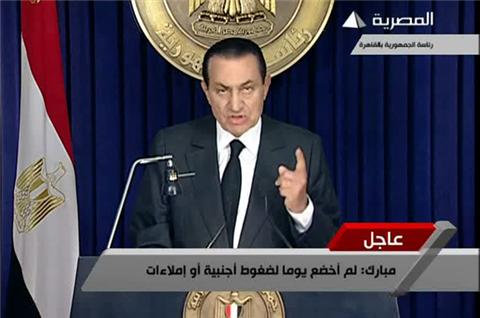
Putting to rest widespread speculations that he will quit, Mubarak announced that he was delegating some authorities to his new vice-president, Omar Suleiman, a close confidante.
In a much anticipated speech, Mubarak said he had put into place a framework that would lead to the amendment of six constitutional articles (including articles 77, 88, 93 and 189, and the annulment of article 179).
“I can not and will not accept to be dictated orders from outside, no matter what the source is,” Mubarak said.
He said he was addressing his people with a “speech from the heart”.
Mubarak said that he is “totally committed to fulfilling all the promises” that he has earlier made regarding constitutional and political reform.
“I have laid down a vision … to exit the current crisis, and to realise the demands voiced by the youth and citizens … without undermining the constitution in a manner that ensures the stability of our society,” he said.
Mubarak said he had “initiated a very constructive national dialogue … and this dialogue has yielded preliminary agreement in stances and views”.
A state of emergency, which has been in place since Mubarak took power 30 years ago, remains in place, though the president promised to lift it as some unspecified point in the future.
“I will remain adamant to shoulder my responsibility, protecting the constitution and safeguarding the interests of Egyptians [until the next elections].
“This is the oath I have taken before God and the nation, and I will continue to keep this oath,” he said.
Mubarak said the current “moment was not against my personality, against Hosni Mubarak”, and concluded by saying that he would not leave Egyptian soil until he was “buried under it”.
Mubarak’s comments were not well-received by hundreds of thousands gathered at Cairo’s Tahrir [Liberation] Square and in other cities, who erupted into angry chants against him. Pro-democracy protesters had been expecting Mubarak to resign, and their mood of celebration quickly turned to extreme anger as they heard the president’s speech.
Rawya Rageh, Al Jazeera’s correspondent in Liberation Square said the “mood completely altered as the president progressed with his speech”, with protesters expressing “frustration and anger” at him.
Hundreds took off their shoes and waved them angrily at a screen showing Mubarak’s speech, shouting “Leave, leave!”
Mohamed ElBaradei, an opposition figure and former chief of the International Atomic Energy Agency, responded to the speech by saying “Egypt will explode. Army must save the country now”, on the microblogging website Twitter.
‘Go back home’
Omar Suleiman, the vice-president, addressed the nation in a televised address shortly after Mubarak’s speech, and called on protesters to “go back home” and “go back to work”.
”] He said he had been delegated by the president “the responsibilities to safeguard the stability of Egypt, to safeguard its … assets … to restore peace and security to the Egyptian public, and to restore the normal way of life”.
He said he had been delegated by the president “the responsibilities to safeguard the stability of Egypt, to safeguard its … assets … to restore peace and security to the Egyptian public, and to restore the normal way of life”.
He said that a process of dialogue with the opposition had yielded positive results, and that “a roadmap has been laid down to achieve the majority of demands”.
The vice-president said that steps had to be taken to “safeguard the revolution of the youth”, but also called for protesters to “join hands” with the government, rather than risk “chaos”.
He told Egyptians “not [to] listen to satellite television stations, whose main purpose is to fuel sedition and to drive a wedge among people”.
Army meeting
Earlier, the Supreme Council of Egyptian Armed Forces had met to discuss the ongoing protests against Mubarak’s government.
In a statement entitled ‘Communique Number One’, televised on state television, the army said it had convened the meeting response to the current political turmoil, and that it would continue to convene such meetings.
Thurday’s meeting was chaired by Mohamed Tantawi, the defence minister, rather than Mubarak, who, as president, would normally have headed the meeting.
“Based on the responsibility of the armed forces and its commitment to protect the people and its keenness to protect the nation… and in support of the legitimate demands of the people [the army] will continue meeting on a continuous basis to examine measures to be taken to protect the nation and its gains and the ambitions of the great Egyptian people,” the statement.
Tens of thousands poured into Tahrir Square after the army statement was televised. Thousands also gathered in Alexandria, Egypt’s second city, our correspondent there said.
Earlier, Hassan al-Roweni, an Egyptian army commander, told protesters in the square that “everything you want will be realised”.
Hassam Badrawi, the secretary general of the ruling National Democratic Party (NDP), told the BBC and Channel 4 News earlier on that he expected Mubarak to hand over his powers to Omar Suleiman, the vice-president during his address.
“I think the right thing to do now is to take the action that would satisfy … protesters,” Badrawi told BBC television in a live interview.
Ahmed Shafiq, the country’s prime minister, also told the BBC that the president may step down on Thursday evening, and that the situation would be “clarified soon”. He told the Reuters news agency, however, that Mubarak remained in control, and that “everything is still in the hands of the president”.
However, Anas el-Fekky, Egypt’s information minister, denied all reports of Mubarak resigning from early in the day.
“The president is still in power and he is not stepping down,” el-Fekky told Reuters. “The president is not stepping down and everything you heard in the media is a rumour.”
Mubarak met with Suleiman, the vice-president, at the presidential palace ahead of his address.
Protesters expected resignation
Mahmoud Zaher, a retired general in the Egyptian army, told Al Jazeera earlier in the day that Mubarak’s absence from the army meeting was a “clear and strong indication that [Mubarak] is no longer present”, implying that the Egyptian president was not playing a role in governance any longer.
”] Protesters had earlier responded to statements from political leaders as indicating that they had been successful in their key demand of wanting Mubarak to step down.
Protesters had earlier responded to statements from political leaders as indicating that they had been successful in their key demand of wanting Mubarak to step down.
Wael Ghonim, the Google executive who has played a key role in helping protesters get organised, said on the microblogging site Twitter on Thursday evening: “Mission accomplished. Thanks to all the brave young Egyptians.”
Ahead of the speech, Jacky Rowland, our correspondent in Tahrir Square, described the atmosphere as “electric”, with “standing room only” in the central Cairo area. She said that thousands gathered there were “celebrating a victory which has been anticipated, rather than actually achieved”.
In Alexandria, Jamal ElShayyal, our correspondent, said the atmosphere turned “from joyous to now furious” as Mubarak completed his speech.

